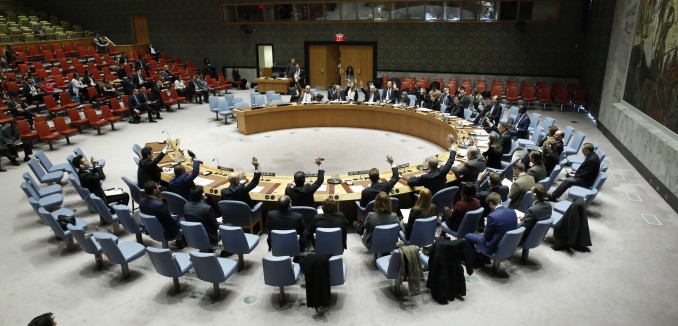Passing a proposed resolution on Israeli settlements at the United Nations Security Council would “vastly magnify” the obstacles to Israeli-Palestinian peace, a leading legal expert wrote in The Washington Post Thursday.
“The proposed resolution denounces any Jewish presence in eastern Jerusalem and the West Bank as illegal and demands that Israel immediately choke off such communities,” wrote Eugene Kontorovich, a law professor at Northwestern University and head of the Kohelet Policy Forum’s international law department. He observed that while these same areas were “entirely cleansed of their ancient Jewish populations during the Jordanian invasion and occupation in 1949,” the resolution implies “that Israel, upon retaking these areas in 1967, was obligated to indefinitely forbid Jews from living in these areas (but the U.N. has amazingly avoided applying these supposed rules anywhere else).”
The resolution was briefly introduced by Egypt on Thursday before being withdrawn. It is reportedly being reintroduced on Friday. The United States can use its veto power to block the resolution, but State Department spokesman John Kirby refused to say on Thursday how the United States would have voted. “I think we were interested to see how the debate and discussion would unfold, and I think I’d leave it at that,” he told reporters.
Kontorovich noted that similar resolutions have been decried by leaders of both the Democratic and Republican parties, including Hillary Clinton and President-elect Donald Trump, “as well as near-unanimous majorities in both houses of Congress and an array of Democratic foreign policy experts, including former Senate majority leader and Obama administration peace negotiator George Mitchell.”
While the legal implications of the resolution are “murky,” since it does not call on the Security Council to impose sanctions on Israel, passing it would “reinforce all the dynamics that have made a solution more remote despite eight years of pressure on Israel by Obama,” he wrote.
Kontorovich argued that the resolution’s success would encourage the Palestinian Authority to continue pursuing unilateral actions against Israel at the UN, instead of agreeing to bilateral peace talks, which the PA committed to under the Oslo Accords. While Palestinian negotiators may favor this course since, “unlike Israel, the international community asks nothing of the Palestinians in return,” this process would never secure a sustainable peace, as it only bolsters Palestinian maximalism while ignoring Israeli interests. “Indeed, this is exactly what the U.S. ambassador to the U.N., Susan Rice, said when vetoing a similar resolution in 2011,” Kontorovich noted. He added that such a move “will give Israel no reason to think that future concessions [in peace negotiations] will not lead to empty promises as well.”
The resolution may also reinforce the notion that decades of Palestinian rejectionism have no negative long-term ramifications. “The Palestinians have been offered an independent state in the peace negotiations in 2000 and 2001, and apparently Netanyahu was prepared to make far-reaching concessions in 2014. Each time, the Palestinians said no,” Kontorovich observed. “Never has there been a national independence movement that has refused an independence offer on the grounds that it does not include all the territory the movement seeks.…Palestinian rejection of successive proposals carries no negative consequences for them — it just raises the expectations from Israel in the next round. Similarly, the Palestinians will not fully accept whatever the Security Council gives them, but only use it as a basis for further demands.”
Trump has expressed his strong opposition to the resolution, saying in a statement on Thursday that “peace between the Israelis and the Palestinians will only come through direct negotiations between the parties, and not through the imposition of terms by the United Nations. This puts Israel in a very poor negotiating position and is extremely unfair to all Israelis.”
Given Trump’s stance, passing the resolution could have severe ramifications for the UN itself. “The cynical use of the U.N. to bypass U.S. electoral outcomes and constrain the next president’s policy could lead to a severe deterioration of relations between Washington and Turtle Bay,” Kontorovich wrote. “Trump has consistently opposed Obama’s turning to the U.N. to create facts on the ground for U.S. policymakers or to avoid Congress.”
The Trump administration could retaliate by cutting UN funding, or by vetoing marginal resolutions that the U.S. would otherwise tolerate in order to weaken it from the inside. Trump “could also nix the reauthorization of U.N. peacekeeping missions,” Kontorovich noted, “which bring with them plague and rape but are still in many ways the pride of the U.N.”




